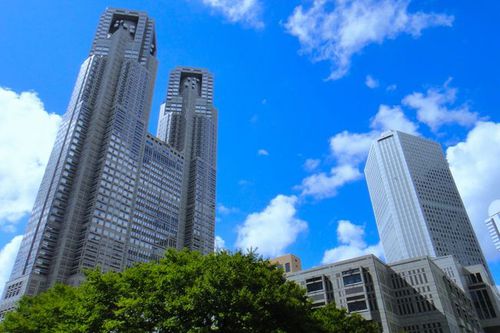April 10, 2015
Tokyo Plans to Increase Renewable Energy Ratio to 20% by 2024
Keywords: Energy Policy Local government Renewable Energy

Image by Hidewo Ishida
The Tokyo Metropolitan area consumes huge amounts of electricity and energy to sustain its economic and urban activities. Meanwhile, since the Great East Japan Earthquake in 2011, it has become increasingly important to boost the ratio of renewable energy use, as well as to reduce energy consumption, while considering environmental issues and our lifestyles. The Tokyo 2020 Olympic and Paralympic Games will be an important opportunity to demonstrate both in Japan and to the world renewable energy has been making steady advances.
In June 2014, the Tokyo Metropolitan Government (TMG) held a meeting of its Review Committee for Expanding Renewable Energies to discuss specific measures and processes to expand the use of renewable energy.
After the discussion, the Committee decided to aim to increase the rate of renewable energy in Tokyo's total energy consumption to around 20 percent by 2024. It also specified individual goals for each category, such as introduction of photovoltaic (PV) power generation of approximately 1 million kilowatts by 2024, about four times that of 2012. Also, as a related initiative, TMG will introduce approximately 22,000 kilowatts of PV power generation by 2020 in its facilities. In addition, TMG set the goal of introduction of cogeneration systems for business use to 600,000 kilowatts by 2024, about twice that of 2012.
As a concrete measure for the introduction of renewable energy facilities on the supply side, TMG is striving to revitalize urban and rural areas, through waste biomass power generation and utilization of rich wood biomass resources. Also, since hydropower is a stable and reliable power source, TMG will enhance medium- and small- scale hydroelectric power generation, in which both public and private institutions have been involved. Furthermore, TMG will expand the introduction of renewable energy to its facilities and promote local consumption of locally produced renewable energy in the Tama region and islands within the jurisdiction of TMG.
For energy management on the demand side, TMG will promote stable and efficient use of renewable energy by demand control while optimizing energy use and minimizing energy consumption. Cogeneration systems will be more important in terms of energy demand and supply adjustment and disaster prevention, along with the contribution to energy conservation and reduction of demand through the use of high-efficiency energy.
For efforts to expand renewable energy use in the future, by using new materials and structures, technology is being developed for high-efficiency solar power batteries that far surpass current batteries in energy conversion efficiency. R&D is also under way for ocean energy, balancing of energy supply and demand, mechanisms to promote renewable energy, and the use of algae as an energy source.
TMG expects to achieve these objectives by expanding the introduction of renewable energy, enhancing energy conservation, and R&D of new technologies throughout Tokyo. There are high hopes that these efforts will contribute to a sustainable future.
Related JFS Articles
Related
"JFS Newsletter"
- 'Yumekaze' Wind Turbine Project Connects Metro Consumers and Regional Producers: Seikatsu Club Consumers' Co-operative
- Shaping Japan's Energy toward 2050 Participating in the Round Table for Studying Energy Situations
- Nishiawakura's Initiative for 100% Energy Self-Sufficiency, and a Municipal ICO Scheme
- Actions Toward 100% Renewable Energy in Japan
- Sustainable Community Building in Shimokawa: Recycling-Oriented Forest Management Enabling Permanent Use of Forest Resources
Related
"Popular Articles"
- Current Status of Renewable Energy in Japan (2015)
- Offshore Wind Farm Withstands Great East Japan Earthquake and Tsunami
- Current Status of Renewable Energy in Japan (2014)
- Geothermal Power: Japan Has World's Third Largest Geothermal Reserves, 60 Percent of Which Can Be Developed
- Tokyo Plans to Increase Renewable Energy Ratio to 20% by 2024


